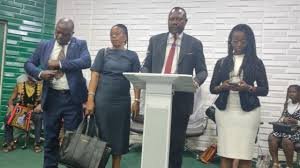Despite the existence of the Nigeria Disability Act, persons with disabilities (PWDs) in the country continue to face rights denial, according to activist Lois Auta-Udonkata, founder of Network of Women with Disabilities in Nigeria.
Speaking at the inaugural Joinbodi Cohort panel session organised by the Budgit Foundation, Auta-Udonkata affirmed the rights of PWDS to participate actively in governance, as stipulated by Article 29 of the United Nations Convention on the Rights of Persons with Disabilities, which Nigeria ratified in 2007.
“However, this right is not given to us” she stated, pointing out the lack of representation of persons with disabilities in key government appointments except Ahba Isa, who was appointed in November 2023 as the Senior Special Assistant to the President on Disability Matters.
However, she disclosed that Isa was later asked to work with the National Commission for Persons with Disabilities, which was established in 2019 to safeguard the rights of persons with disabilities.
“Section 30 of the Nigeria Disability Act also enshrines that persons with disabilities should be prioritised in terms of electoral processes and governance. Five per cent have been asked that every opportunity should be reserved specifically for citizens with disabilities, but it is nothing to write home about.”
Speaking further, Auta-Udonkata criticised the practice of treating PWDs as recipients of pity, rather than acknowledging them as individuals entitled to rights, describing it as an “attitudinal barrier.”
“Most of our people will call someone with disabilities and start sharing rice, sometimes used clothes and other charity things, out of pity. They see the disability first before the person,” she said.
According to the 2018 Nigeria Demographic and Health Survey, an estimated 7% of household members above the age of five experience some level of difficulty in at least one functional domain, such as seeing, hearing, communication, cognition, walking, or self-care.
Similarly, 1% either have a lot of difficulty or cannot function at all in at least one domain. Persons with disabilities in Nigeria face stigma, discrimination, and barriers to accessing basic social services and economic opportunities.
Reacting to this figure, Auta-Udonkata urged institutions and organisations to adopt disability equality policies, appoint gender equality and social inclusion officers and reserve employment opportunities for graduates with disabilities.
“And when you are recruiting, how many percent have you reserved for graduates with disabilities? We have graduates, we have the capacity. We have many women with PhDs who are persons with disabilities.
“So what is it that we cannot do? We have the potential, the talents, the gift that is in us. We need an attitudinal barrier to be removed from Nigeria so that persons with disabilities will be included,” she noted.
Auta-Udonkanta also called on the government, civil society, private sector, and media to work together to promote the social inclusion of persons with disabilities and ensure that they are not left behind in the development agenda of the country.























